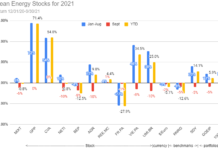Despite Trump’s vow to roll back all measures endorsed by Obama, his Environmental Protection Agency head Scott Pruitt is backing off plans to scuttle the U.S. biofuel policy. The Trump administration had planned to change regulatory standards to reduce the amount of renewable fuel that must be blended with conventional fossil fuel for gasoline and diesel supplies. In the third week in October 2017, Pruitt sent a letter to Congressional leadership indicating the renewable fuel volume mandates for 2018 would remain unchanged.
Most analysts saw the about face as a win for ethanol and renewable diesel producers such as Green Plains (GPRE: Nasdaq), FutureFuel (FF: NYSE)and REX American Resources (REX: NYSE), leaving oil and gas refiners on the losing end of the decision. True enough the Renewable Fuel Standards creates demand for renewable fuels by requiring refiners to buy and blend ethanol, renewable diesel or biofuel into their gasoline and diesel products. In 2017, the EPA mandated the purchase of 312 million gallons of cellulosic biofuel, 2.0 billion gallons of bio-diesel, 4.0 billion gallons of advanced biofuel and 18.8 billion gallons of renewable diesel.
What Trump and Pruitt did not count on in fulfilling their promises to oil and gas companies is the widespread enthusiasm in the corn belt for all-things biofuel. At the first suggestion of a change in the mandate, Congressional leadership from Iowa, Nebraska and Illinois began voicing their opposition to any reduction in the standards. Any erosion in demand for ethanol and other biofuels would have a dramatic impact on these states where corn and fodder sales are highly dependent upon ethanol production.
News articles bemoaning the sad state of affairs for fossil fuel refiners began cropping up almost immediately after Pruitt’s letter made its way to Capital Hill. What seems to have been missed by many following the oil and gas industry is the significant position refiners have taken in renewable fuel production. Valero Energy (VLO: NYSE) was one of the refiners mentioned most frequently in the press coverage of the Trump administration policy roll back. Yet Valero has 50% ownership interest in Diamond Green Diesel, a renewable diesel joint venture with the food by-products recyclerDarling Ingredients (DAR: NYSE). Animal fats are supplied to the joint venture by Darling and the renewable diesel is sent by pipeline directly to Valero’s adjacent oil refinery. An expansion effort is under way to increase the plant’s current capacity of 10,000 barrels per day to 18,000 barrels per day by mid-2018. While Valero does have the expense of blending renewable diesel to meet the EPA mandate, Valero benefits from the profits of its joint venture in producing the renewable diesel. Valero also has extensive ethanol interests. The company owns eleven ethanol plants in the Midwest with a combined nameplate capacity of 1.4 billion gallons per year. Although Valero may use some of the ethanol production for its own blending requirement, most of the ethanol is sold to other refiners.
Thus Valero actually is one of the beneficiaries of the EPA plans to leave the Renewable Fuel Mandate unchanged. Valero management may be complaining about the high cost of standards compliance out of one side of its corporate mouth, the other side is accepting some tidy profits on renewable fuel sales.
Valero is not an exception. ExxonMobile (XOM: NYSE) is among the largest oil refiners in the world. It was among the most vocal in arguing for a lower renewable fuels standard. Yet ExxonMobile has several joint ventures in biofuels and ethanol production and development. In 2016, the company set up a joint venture with Renewable Energy Group (REGI: Nasdaq), a producer of advanced biofuels. The two have been working cooperatively to demonstrate the conversion of sugars into biodiesel using the REG fermentation technology and cellulosic biomass. ExxonMobile is in another joint venture with Synthetic Genomics to modify an algae strain to double its oil content to be used in biofuel production. The company’s press kit claims ExxonMobile has spent over $8 billion over the last fifteen years to develop low-emission fuels. It would seem ExxonMobile has a vested interest in promoting renewable fuels.
The press coverage of the Trump administration’s back-peddling act is missing the point of what is really happing in the transportation fuel industry. It is not so much a matter of renewable versus fossil fuels or refiners against ethanol and biodiesel producers. For the oil and gas refiners it is a matter of weakened demand for gas. Yes, demand for transportation fuel is expected to decline. According to ExxonMobile, in the developed countries of the world, transportation fuel demand is expected to decline by 10% over the next twenty years.
The decline in demand for gas and diesel to keep cars and trucks going is largely the result of improved combustion engines that use advanced technologies to increase fuel efficiency. Engine fuel efficiency is a greater threat to oil and gas refiners than the use of renewable fuels and even the adoption of electric cars. Indeed, it is weakened demand for gas thatExxonMobile cited in its letter to the EPA begging for relief from the U.S. biofuels mandate.
Big, filthy and unwanted! It is tough being a fossil fuel refiner these days. This is why the oil and gas industry had gone to Washington DC begging for help. Since the renewable fuel mandate is expressed in volume terms, as transportation fuel demand in the U.S. slips, a larger percentage of the final product will be composed of a renewable fuel.
Unfortunately, corn fields not oil wells can be seen for miles around the towns where Iowa’s very influential primary elections are held. If there is one thing Donald Trump comprehends is the importance of not getting “voted off the island.” Thus for now the Renewable Fuel Mandate also gets to stay ‘on the island.’
Debra Fiakas is the Managing Director of Crystal Equity Research, an alternative research resource on small capitalization companies in selected industries.
Neither the author of the Small Cap Strategist web log, Crystal Equity Research nor its affiliates have a beneficial interest in the companies mentioned herein.








